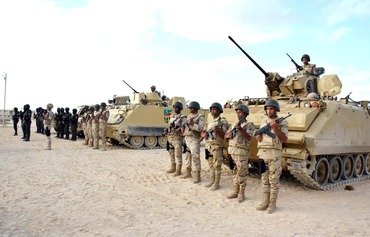Egypt's parliament recently voted to extend its state of emergency for a further three months as it continues its efforts to fight extremist groups.
Lawmakers approved the presidential decree on January 22nd by a two-thirds majority, and it went into effect on January 27th.
The same day the measure was approved, Egypt's interior ministry said it had foiled a plot to conduct terror attacks across the country, and had arrested "at least" six militants, some of whom were connected with the Hasm movement.
According to the decree, "the armed forces and police shall take the necessary measures to confront the dangers and financing of terrorism, protect public and private property and safeguard the lives of citizens".
![Egyptian armed forces embark on a counterterrorism operation in North Sinai. [Photo courtesy of the Egyptian Ministry of Defence]](/cnmi_am/images/2020/02/04/22209-egypt-sinai-emergency-600_384.jpg)
Egyptian armed forces embark on a counterterrorism operation in North Sinai. [Photo courtesy of the Egyptian Ministry of Defence]
Under Egyptian law, a presidential decree to extend the state of emergency must be approved by a majority of the members of the House of Representatives and declared for a specified period not exceeding three months.
It can only be extended for a similar period upon the approval of two-thirds of the members of the House of Representatives.
The approval to extend stems "from parliament's belief that it stands shoulder to shoulder with the Egyptian armed forces, police and all state agencies in their efforts to combat terrorism", said Egyptian MP Salah Hasaballah.
The goal is to "take the necessary actions and measures to protect Egypt's security and stability, which has long faced the threats of extremist groups that engage in terrorism against civilians and state institutions", he told Al-Mashareq.
Sinai development strategy
Egyptian lawmakers believe the security situation calls for the extension of the state of emergency to protect the army and police as they hunt down extremist groups, as well as residents of troubled areas, said Egyptian MP Nader Mustafa.
Extending the state of emergency "is necessary to enable the forces to carry out their tasks and protect the lives of citizens, especially in North Sinai", he told Al-Mashareq.
This is both necessary and essential, he added, as normal circumstances do not allow the armed forces and the police to fight extremist elements to the fullest extent.
The army and police have achieved "considerable success in their counterterrorism operations in North Sinai", he noted.
This in turn supports the implementation of "a comprehensive development strategy for Sinai that encompasses all sectors", Mustafa said.
"Counterterrorism efforts and providing security for the development process require extraordinary measures provided by the state of emergency that parliament agreed to extend," he said.
Parliament, as a legislative authority, stands by and supports the executive authority by providing the legal framework for its daily operations aimed at safeguarding the public against extremist groups, he added.
Besieging extremist groups
The government has been able, in the course of very few years, to besiege extremist groups and destroy their infrastructure, said Amr Darwish, member of the Co-ordination Committee of Parties' Youth Leaders and Politicians.
According to government figures, the number of terrorist attacks dropped from 300 in 2013 to just eight in 2018 and only one in 2019 -- the bombing of the National Cancer Institute in which 19 people were killed -- he said.
"Providing a legal and legislative framework, such as the extension of the state of emergency, enables the executive authority represented by the government to preserve the success it achieved in the past period," he told Al-Mashareq.
Combating extremist groups under extraordinary circumstances requires speed of movement and action, thus the need for the state of emergency, he said.
This enables security forces to move quickly against extremist elements to arrest them and foil their plans, he added.

![Egyptian lawmakers gather in parliament for a plenary session. [Mohammed Mahmoud/Al-Mashareq]](/cnmi_am/images/2020/02/04/22208-egypt-parliament-emergency-600_384.jpg)




